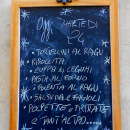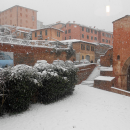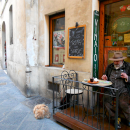A semester in the hills of Tuscany Past Review
By Mallory R (Mount Holyoke College) - abroad from 01/16/2012 to 05/13/2012 with
CET Siena
I gained an immense amount of perspective just by living in another place. Everything is new and different and able to offer you something to think about. I now know that I want to return to Italy as soon as possible. It was completely worthwhile, and I enjoyed wholly my time there. While I was there, probably the best thing I learned was how to live in the moment. That sounds cliche, but I learned that there are always hidden things awaiting discovery, and when you arrive, you know you will only be there for a short time, and there is never any time to waste. Try to immerse yourself in it completely, and not waste too much time on the computer or on skype. I think if I did abroad over again, I would try to get a more academically immersed program than CET was. It is an American program in a foreign city. If that is something you want then it is incredible. I had a nice break from strenuous academics that is at Mt. Holyoke, but I sometimes wished I was in a bigger program while I was there.
Review Photos




Personal Information
| How much international exposure did you have prior to this program? | 2 weeks - 1 month |
Review Your Program
|
* Overall educational experience
Academic rigor, intensity, resources, etc. |
All students are required to take Italian Language studies and a class about Italian Culture. I found the academics to be less challenging than Mt. Holyoke, but that was part of what I wanted from my abroad experience. I had no prior Italian language experience before coming to Siena, and I found the language component very successful. My professor was Italian and a very good teacher. We got through a year long class in one semester, so you really learn a lot by the end, especially because you are constantly practicing outside of class. I am in intermediate Italian at my home institution and feel comfortable in that level. The other classes are interesting, just not that time consuming outside of class. A lot of the classes have field trips, which is really cool. The professors are knowledgeable but also, not very challenging. |
|
* Host Country Program Administration
On-site administration of your program |
The administration was available and helpful when giving advice, but there was only staff member, and so I felt like I didn't have many options when asking for advice about things to do, where to eat, etc. The school was small, and so was the program. |
|
* Housing:
How satisfied were you with your living arrangements? |
I lived in an apartment with 2 Italian students and 3 Americans. I loved the setup, the apartment was really nice. It was a little small, and I did sometimes wish that I had someone else cooking for me. If you live in a homestay you will have a family cook for you. |
| * Food: |
The food in Siena is amazing. Best food I've ever had. It is easy to eat well and not spend a lot of money, but on the other hand, it is easy to spend a lot of money quickly, too |
|
* Social & Cultural Integration:
How integrated did you feel with the local culture? |
I felt like I got to know the town, have my favorite spots, and know people around town, but I did feel like an American throughout the course of my stay in Siena. |
|
* Health Care:
How well were health issues addressed during the program? |
- Healthcare was easily accessible in Siena. There are a lot of pharmacies where you can get over-the-counter medicine, or seek advice. Pharmaceutical people speak English. If your problem is more serious than they can provide, you can be referred to a clinic or hospital. CET provides you with a health care plan that will cover anything you run into. They also are helpful in providing personal healthcare advice, and are willing to take you where you need to go. Compared to at home in the US, I found that pharmacies in Italy were very different. You couldn't just go in and get what you want and buy it. You have to explain to the clerk what ailment you have, and they will give you the medicine you need. If you have something more serious, they require a doctor's note until they can give you anything. I suggest getting your prescriptions filled before you leave for Siena, and make sure you bring with you medicines you are used to and prefer (like Advil, etc.) so you are prepared without having to go to a pharmacy in Italy if necessary. No vaccines needed for this program. |
| * Safety: |
I had no problems when I was in Siena. Siena is a small city comprised mostly of college students and older people. I felt safe walking home by myself, but that is not to say that nothing would ever happen. I am a young woman and tried to keep an eye out for myself at night. During the day, I never felt like there would be a problem. Nothing was stolen from me in my time in Italy. As a young woman, it is important to keep alert in cities bigger than Siena. |
| If you could do it all over again would you choose the same program? |
No
|
Finances
|
* Money: How easily were you able to live on a student's budget?
(1 = not very easy/$200+ on food & personal expenses/week, 2.5 = $100/week, 5 = very easily/minimal cost) |
|
| Not including program expenses, about how much money did you spend on food and other expenses each week? | Between $100-$200 -- depending on travel costs. |
| Do you have any general money-saving tips for future study abroad participants? | Travel abroad was more expensive than I anticipated, and you are bound to have a couple of travel errors (with the train or something) and might have to spend more money than you hoped. I would say that the easiest place to save money would be with food, so try to be aware of all of the things you actually need. In Italy it is tempting to always get the best food, but sometimes it is not smart financially. |
Language
| * Did your program have a foreign language component? | Yes |
|
How much did the program encourage you to use the language?
0 = No encouragement, 5 = frequent encouragement to use the language |
|
| How would you rate your language skills at the beginning of the program? | None |
| How would you rate your language skills at the end of the program? | Beginner |
| What was the highest level language course you had completed prior to departure? | Intermediate in French -- not helpful in Italy. |
| How many hours per day did you use the language? | |
| Do you have any tips/advice on the best ways to practice the language for future study abroad participants? | Don't be scared to mess up! And try to use it as much as possible and with everyone. In Siena, even the people you don't know are willing to listen to your broken Italian. Siena is very authentically Italian, in that not everyone knows English like in a place like Florence. So take advantage of it and practice around your friends too! |
Other Program Information
|
* Where did you live?
Select all that apply |
|
|
* Who did you live with?
Select all that apply |
|
|
* Who did you take classes with?
Select all that apply |
|
| About how many local friends did you make that you will likely keep in touch with? |
A Look Back
| * What did you like most about the program? |
|
| * What could be improved? |
|
| * What do you know now that you wish you knew before going on this program? | The size of the school. I also wish I had studied some Italian before I arrived. When I got there, I fell in love with Siena, and wanted more than anything to communicate with locals more than I could. I think it would have enhanced my experience greatly. |
Reasons For Studying Abroad
| To help future students find programs attended by like-minded individuals, please choose the profile that most closely represents you. |
The Avid AdventurerThe wardrobe you packed was better suited for a semester of camping than club hopping. Outdoorsy, you might forgo a crazy night out for an early all-day adventure. You'd rather take in the rich culture of an old town than the metropolis of a modern city, but for you getting off the grid is ideal. |
Individual Course Reviews
| Course Name/Rating: |
Italian Cultural History |
| Course Department: | Politics, History, Sociology |
| Instructor: | David Travis |
| Instruction Language: | English |
| Comments: | The class was not challenging outside of class. We had readings, but they were not completely necessary to comprehend or take something from the lecture in class. There were many fieldtrips with this class. We went wine/cheese tasting which was amazing. We went to a farm in Tuscany and got a tour of a cheese farm and got to see the equipment used to make the cheese. The tour was in Italian. Then we went to a winery, which was amazing too. We got a tour of the barrels and got to taste amazing wine. That was also in Tuscany. We went on a field trip to Florence, and the class culminated in a 4 day trip to Catania, Sicily. That was absolutely amazing. The trip is structured in a such a way where you learn so much in few days. We hiked Mt. Etna, went to a soccer game, visited the amazing fish and vegetable markets, and saw many other cool stops in the city. The teacher was knowledgeable, though I wish the professor of this course was Italian because I think that would have enchanced the lens in which I learned the material. Italy has a such a rich and unique history, and having an Italian tell the story would have been incredible. Professor Travis, however, clearly loves Italy very much and has lived here for many years. He knew what he was talking about, but sometimes the lectures were boring. I participated in class less than I would have had in my home institution. I do not think the class was really that participation based, like many of my classes are at Mt. Holyoke. We were assessed with a midterm, a final, two papers, and a short biography presentation in class. Overall, the class was necessary in that I learned MANY important components of post- World War II history. My biggest critique is really just that I wish it had been taught by an Italian instead of an American. |
| Credit Transfer Issues: | CET gives you an abroad transcript through UVA (U. of Virginia), so if you are enrolled in a US college or university I don't think you'll have any problems. Just make sure you keep your syllabus, midterms, and papers if you want to get the courses to count towards a major or minor. My home institution required that I had all of the papers in order for them to consider the class for major/minor credit. |








